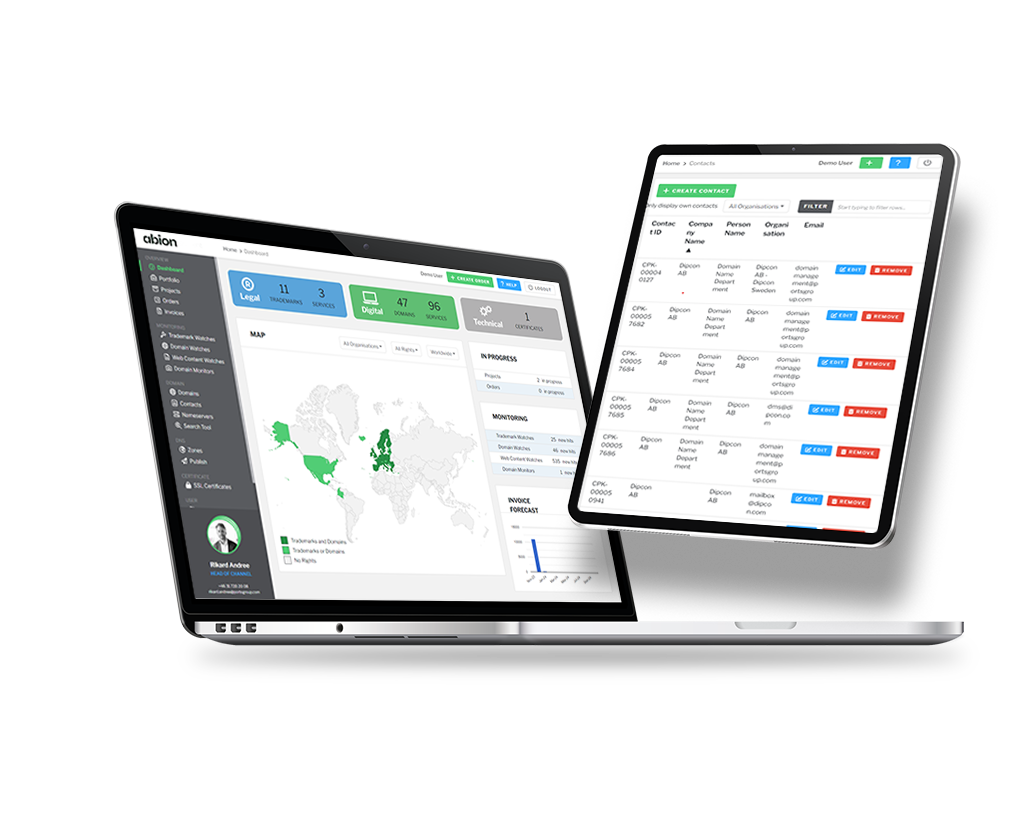
Your All-in-One DNS Provider
With a complete range of DNS services and a team of in-house experts, we provide the latest solutions tailored to your needs. We handle everything securely, ensuring seamless management through our user-friendly customer platform.
Monitoring
We are responsible and will monitor all DNS for you
24/7
In-house
Avoid intermediaries. We manage everything in-house
DNS: The Most Important Service of All
We at Abion value DNS as the most important domain-related service of all because without the DNS the domain name quite simply doesn’t work. With us, all management takes place with the highest security and redundancy.
- Choose what solution suits your needs
- Comprehensive logging for total traceability
- Servers around the globe - reduces the risk of an attack
- Schedule changes and restore zone backup through API access.

A Tailor-Made Solution For You
We offer the latest DNS services with in-house IT expertise. Which DNS solution that suits your company depends on your business, your size and your specific needs. Get in touch and we'll guide you!
Reliable Service Delivery
DNS services ensure reliable and efficient service delivery by directing requests to the appropriate servers. With DNS, companies can configure load balancing, allowing traffic to be distributed across multiple servers, enhancing performance, and preventing overloading. It also enables companies to implement failover mechanisms, directing requests to alternative servers in case of server failures, ensuring uninterrupted service availability.
Anycast DNS is Included in Our Business Package
It is a technology for routing network traffic that increases the speed and availability of your online resources. With Anycast, an IP address becomes available in multiple geographic locations. This is included in our Business package.
This service is for all kinds of organizations and authorities, both large and small, that place high demands on the security, performance, and availability of their resources online. It is especially beneficial for customers with a global presence and users worldwide.
Add Automated DNSSEC
DNSSEC is an additional security addition to our DNS service. With DNNSEC implemented, DNS spoofing is prevented, that is, phishing programs where the user is tricked into visiting a fake website, instead of your verified website.
Flexible and Secure Server Solution
Do you need a virtual server solution that gives you higher security? With a virtual server, or virtual private server, VPS, as it is often called, you get exclusive rights to both space and performance.

Smooth Administration - All Services in One Place
The service is administered through your customer platform, Abion Core. This is where you manage all administration of zone files, including publication scheduling and history. The control panel is protected with SSL certificates and two-factor authentication is available where surveillance takes place 24/7, year-round, of the entire production platform.
Would you like to know more about our DNS management?
Contact us for more information!
Frequently Asked Questions about DNS
Recursive DNS queries involve the complete translation of a domain name into an IP address by querying multiple servers, while non-recursive queries rely on cached data to provide faster domain resolution without querying additional servers. This can improve DNS resolution speed.
The different types of DNS servers are authoritative DNS servers, recursive DNS resolvers, and secondary DNS servers. Authoritative DNS servers hold definitive DNS records, while recursive DNS resolvers act as intermediaries. Secondary DNS servers provide redundancy.
A domain name typically has several purposes. It can be used for website, email, and multiple other functions. In order to visit a website or send an email, you need to know the IP address of the specific server where that website or mail system is located. Because only a few people are able to memorize IP addresses, Domain Name System – DNS – was created.
The main function of DNS services is to translate human-readable domain names into machine-readable IP addresses, acting like a phonebook for the internet. This allows users to access websites without needing to memorise complex IP addresses.
DNS caching improves performance by storing DNS records locally, leading to faster domain resolution and reduced network traffic. This results in reduced latency, faster response times, and less workload on authoritative DNS servers.
When choosing a DNS service, consider factors such as speed, security features, and user accessibility for managing and configuring DNS settings. These factors are crucial for a reliable and secure DNS service.
<p>DNS is core in the construction of all online services. Websites, emails, business systems, IP telephony, apps, etc. are all dependent on DNS working. That’s why DNS service outages can create a lot of problems for businesses, the consequences being lost revenue, reduced productivity, and damaged brand trust.</p>
<p>One reason why they stop working could be that the provider has poor security, such as a lack of redundancy or a vulnerability to attacks. Or it could simply be due to a lack of control over where you have your DNS services and who is responsible for them. This is something that many discover too late. That’s why it is vital to find the right provider.</p>
This service is for all kinds of organizations and authorities, both large and small, that place high demands on the security, performance, and availability of their resources online.
An Introduction to DNS Services
Think of DNS services as the Internet’s directory service. When you input a domain name like www.example.com into your web browser, the DNS translates this human-readable name into a machine-readable IP address, facilitating the connection to the website. This process is fundamental for internet connectivity, allowing users to access websites without memorising complex numeric IP addresses.
For enterprises, DNS services are critical in ensuring robust, secure, and efficient internet operations. They play a crucial role in managing the mapping between domain names and IP addresses, which is essential for maintaining the seamless operation of business-critical applications and services. Enterprise DNS solutions often include advanced features such as load balancing, failover capabilities, and global traffic management to enhance performance and reliability.
Secure, Fast, and Reliable: The Power of DNS
DNS servers are integral to determining which server an end user will reach when they input a domain name. This is especially important for businesses that rely on high availability and fast response times for their online services. Enterprise-grade DNS solutions often incorporate security features like DNSSEC and DNS over HTTPS (DoH) to protect against DNS spoofing and other cyber threats, ensuring the integrity and confidentiality of DNS queries.
For IT professionals, DNS services offer a range of configuration options and tools for fine-tuning performance and security. These include custom DNS records, Anycast routing, and geolocation-based routing, which enable precise control over how DNS queries are resolved. DNS query logs and analytics provide valuable insights into traffic patterns and potential security issues, allowing for proactive management and optimisation of DNS infrastructure.
In summary, DNS services are not just about translating domain names into IP addresses; they are a cornerstone of enterprise IT strategy, providing the foundation for secure, reliable, and high-performance internet connectivity.
DNS Services Overview
- DNS services are essential for translating domain names into IP addresses, acting like the Internet’s phonebook and enabling seamless web browsing.
- There are three main types of DNS servers: authoritative DNS servers, recursive DNS resolvers, and secondary DNS servers, each playing a critical role in the domain name resolution process.
- Choosing the right DNS service is important for improving speed, security, and user accessibility; factors such as DNS over HTTPS and DNSSEC can enhance security and performance.
Types of DNS Servers
Understanding the different types of DNS servers involved is integral to fully grasp how DNS services operate. These servers can be categorised into three main types: authoritative DNS servers, recursive DNS resolvers, and secondary DNS servers. Each type plays a specific role in the domain name resolution process, working together to ensure that your DNS queries are resolved efficiently and accurately.
Holding the definitive DNS records for specific domain names, authoritative DNS servers offer final answers to queries within their zones. Recursive DNS resolvers act as intermediaries, querying multiple servers to find the necessary DNS information. Secondary DNS servers provide redundancy, holding copies of DNS records to ensure reliability and accessibility.
Different Types of DNS Servers
Authoritative DNS Server
Authoritative DNS servers are the ultimate source of truth for DNS queries. They hold the definitive DNS records for specific domain names and provide final answers to queries about those domains. When a recursive DNS resolver queries an authoritative DNS server, it receives the precise IP address information needed to connect to the desired website.
These servers maintain a directory of domain names and their corresponding IP addresses, ensuring that the data is accurate and up-to-date. Responding directly to queries from recursive DNS resolvers, authoritative DNS servers ensure users can access the websites they seek reliably, playing an integral part in the overall DNS resolution process.
Recursive DNS Resolver
Within the DNS resolution process, recursive DNS resolvers function as diligent intermediaries. When a DNS client initiates a query, the recursive resolver takes on the task of finding the IP address for the requested domain name. It starts by checking its cache; if the information isn’t there, it queries other DNS servers, including root servers, TLD servers, and ultimately authoritative servers, to obtain the required data.
The recursive resolver’s role is crucial because it:
- Reduces the workload on individual DNS clients by performing the complete translation of domain names to IP addresses
- Minimises latency and enhances the user’s browsing experience
Secondary DNS Servers
Offering a layer of redundancy in the DNS infrastructure is a primary role of secondary DNS servers. By holding copies of DNS records from primary DNS servers, they ensure that DNS queries can still be resolved even if the primary server is unavailable. This redundancy is vital for maintaining the reliability and accessibility of domain name resolutions.
Caching also serves as a load balancer, distributing DNS traffic more evenly across servers and infrastructure. This helps prevent any single server from becoming overwhelmed with requests, thereby improving the overall stability and performance of the DNS system.
How DNS Queries Work
The process of DNS queries is a fascinating journey that starts from a user’s computer and passes through multiple DNS servers to resolve a domain name into an IP address. Entering a domain name into your web browser triggers your computer to send a request to a DNS server to get the corresponding IP address. This request, known as a DNS query, initiates a series of steps involving various types of queries and servers working together.
A typical DNS lookup involves recursive and non-recursive queries, with the DNS resolver playing a central role in managing these requests. The resolver may query root DNS servers, TLD servers, and authoritative servers to gather the necessary information. This multi-step process ensures that the DNS query is resolved accurately and efficiently, allowing users to access the desired websites without delay.
Recursive Query
In a recursive DNS query, the DNS client relies on the DNS resolver to perform the complete translation of the domain name into an IP address. Starting with querying the root server, the resolver then moves on to the TLD servers, and finally reaches the authoritative DNS server to obtain the IP address.
This process involves multiple steps and can be time-consuming if the information is not readily available. However, by handling the entire sequence of queries, the recursive resolver ensures that the DNS client receives the necessary IP address, enabling seamless connectivity to the desired website.
Non-Recursive Query
Non-recursive queries offer a faster alternative by leveraging cached data. Receiving a non-recursive query prompts a DNS server to check its own cache for the required information. If the data is available, the server responds directly to the client, eliminating the need to query additional servers.
This method is highly efficient as it reduces the load on DNS servers and minimises latency. However, if the requested information is not in the cache, the server will respond with an error, indicating that the data was not found. Despite this limitation, non-recursive queries are a valuable tool for enhancing DNS resolution speed and performance.
DNS caching is a powerful mechanism that stores DNS records locally to speed up domain resolution. When a DNS resolver receives a query, it first checks its cache for the required information. If available, the resolver responds immediately, reducing latency and improving performance. This process optimises network traffic by reducing the number of DNS queries, minimising the need to query external servers, conserving bandwidth, and enhancing the efficiency of the DNS system
Where DNS Caching Occurs
DNS caching can occur at various levels, such as within browsers, operating systems, and network-level servers like those of ISPs. Browser-level caching reduces the processing steps for DNS requests, leading to faster response times. At the operating system level, caching temporarily stores DNS responses for quicker access. Network-level caching at ISPs further reduces the load on external DNS servers and improves overall efficiency.
Advantages of DNS Caching
Faster response times by providing quick access to cached DNS queries:
- Reduced workload on authoritative DNS servers, enhancing their reliability and scalability
- Improved capacity to handle higher traffic volumes without compromising performance.
- A smoother and more efficient browsing experience for users
Choosing the Right DNS Service
To optimise your online experience, choosing the right DNS service is of crucial importance. Determining the best DNS service for your needs involves considering factors such as speed, security features, and user accessibility. Different DNS providers offer various benefits, including enhanced performance, privacy, and security, making it essential to choose a service that aligns with your requirements.
We will guide you through these factors in detail, providing insights into how they impact your browsing experience and what to look for when selecting a DNS service. By understanding these aspects, you can make an informed decision and enjoy a faster, safer, and more reliable internet connection.
Speed and Performance
Clients browsing experience can be significantly influenced by the speed of DNS query resolution. Slow DNS resolution can lead to delayed website loading times, while fast DNS servers can enhance your overall internet speed. Factors such as DNS lookup times, server distance, and the power of the server are crucial in determining the speed of a DNS service.
Public DNS servers like Google Public DNS often provide faster resolutions compared to ISP servers due to their extensive global network. Tools like Namebench and DNSPerf can help identify the fastest DNS servers, ensuring that you choose a service that offers optimal performance for your location.
Security Features
When selecting a DNS service, security is a top priority. Features like DNS over HTTPS (DoH) encrypt DNS queries, providing enhanced privacy by making them indistinguishable from other web communications. This is crucial for protecting your data from potential eavesdropping and tampering.
By choosing a DNS service that supports DNS over HTTPS, you can ensure that your DNS queries are secure and your data is protected.
Additionally, DNSSEC is an important feature that prevents unauthorised modifications to DNS data, ensuring the integrity of the information. Some DNS servers, also offer protection against malicious domains and DDoS attacks, providing a secure and reliable browsing experience.
User Accessibility
Another consideration is user accessibility, which is equally important. A user-friendly DNS service often includes a simple interface for easier DNS management, making it accessible even to those with limited technical knowledge. This ease of management is essential for ensuring that users can configure and utilise the DNS service effectively.
Abion offer advanced configuration options, including:
- Custom DNS records
- DNSSEC (Domain Name System Security Extensions) support
- Anycast routing
- Load balancing
- Geolocation-based routing
These options allow users to tailor the service to their specific needs, enhancing the overall user experience and making it easier to manage DNS settings and optimise internet connectivity with their internet service provider.
Summary
In conclusion, DNS services play a vital role in enhancing your online experience by translating domain names into IP addresses, making the internet more accessible. Understanding the different types of DNS servers, such as authoritative, recursive, and secondary servers, helps appreciate their roles in the DNS resolution process.
The process of DNS queries, including recursive and non-recursive queries, is essential for efficient domain name resolution. DNS caching further improves performance by storing DNS records locally, reducing latency and network traffic. Choosing the right DNS service involves considering factors like speed, security features, and user accessibility to ensure a fast, secure, and reliable internet connection.
By making informed decisions about your DNS service, you can enjoy a smoother, more efficient online experience. So, take the time to evaluate your options and select a DNS service that meets your needs, ensuring that your internet experience is enhanced in every possible way.




